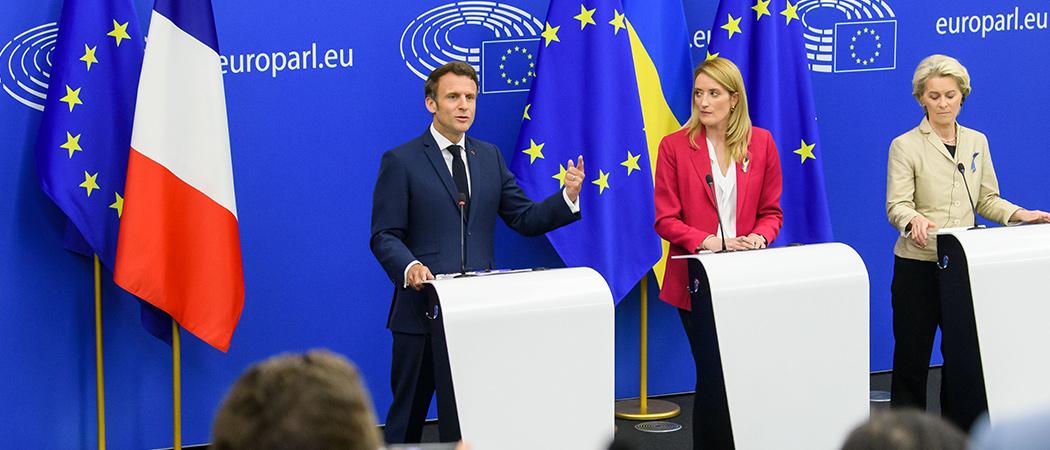In a speech at the closing ceremony of the Conference on the Future of Europe, the French president praised the EU’s scientific prowess, and called for treaty changes

Emmanuel Macron, French President. Photo: consilium.europa.eu
Newly re-elected French president Emmanuel Macron made yet another plea for technology sovereignty, while praising the EU’s ability to turn scientific results into much needed technologies at the closing ceremony of the Conference on the Future of Europe in Strasbourg on Monday.
Macron was among the first EU leaders to call on the EU to develop and produce its own critical technologies and reduce its dependency on imports from China and the US. He welcomed the conclusions of the conference but said the EU should go further and invest more in its own technologies in defence, space, climate change mitigation and digitalisation.
The French president said the EU went through significant crises over the past 15 years: the 2008 financial crash, the Greek debt crisis, Brexit, the pandemic and now the war in Ukraine have laid bare Europe’s weaknesses and vulnerabilities in semiconductors, healthcare and defence.
Macron emphasised that the last two crises, the COVID-19 pandemic and the war in Ukraine, have prompted an unprecedented sense of unity.
“Banding together, science, democracy and effectiveness we managed to produce a vaccine on our soil, becoming the biggest vaccine manufacturing part of the world, while keeping our borders open, exporting and showing vaccine solidarity,” Macron said. “That is the Europe that we should be proud of, a Europe of democracy, of open and free science, and of effectiveness.”
German chancellor Olaf Scholz did not attend the ceremony, which was led by Macron and the presidents of the European Parliament and Commission, Roberta Metsola and Ursula von der Leyen.
Macron said the EU should invest more in new defence technologies and member states should be able to identify the technologies they need to prepare for potential future areas of conflict “at sea, in the air, and in space.”
He also called for more investments in nuclear energy and renewables so the EU could move away from fossil fuels, especially oil and gas imported from Russia.
The future of Europe
Macron’s speech in Strasbourg was the highlight of a ceremony which ended a process that was contested, if not deemed pointless, by many critics.
The Conference on the Future of Europe was envisaged as way to listen to European citizens and to follow up on recommendations on the way to a comprehensive reform process of the EU.
In the research world, the conference was met with disappointment. In a statement published in November, EU research stakeholders complained that research and innovation were not among the nine topics on the conference agenda. Specific proposals for the future of research and innovation were submitted under a catch-all “other ideas” chapter.
For agriculture, the conclusions of the conference call for increased investment in research into more sustainable alternatives to chemical pesticides and fertilisers. Citizens and stakeholders also called for new technologies, including precision farming, to be used in agriculture for a more sustainable food production.
There was also a call for a new investment package for “climate-friendly technologies and innovations” that would be paid from new carbon adjustment levies and climate import tariffs. The conference also concluded the EU should spend money on research into alternative packaging.
In healthcare, stakeholders want the EU to increase investments in research on the impact of the use of antibiotics and the impact of endocrine disruptors on human health.
The conference conclusions also call on the EU to “protect its strategic research” in space, cybersecurity and the environment.
It’s unclear how these proposals will be taken further and turned into real policies as the conference conclusions cannot prompt changes of EU treaties. In his speech Macron called for the bloc’s fundamental law to be revised, but a group of 13 member states have already rebuffed that idea, calling for any changes to happen without treaty changes.





 A unique international forum for public research organisations and companies to connect their external engagement with strategic interests around their R&D system.
A unique international forum for public research organisations and companies to connect their external engagement with strategic interests around their R&D system.